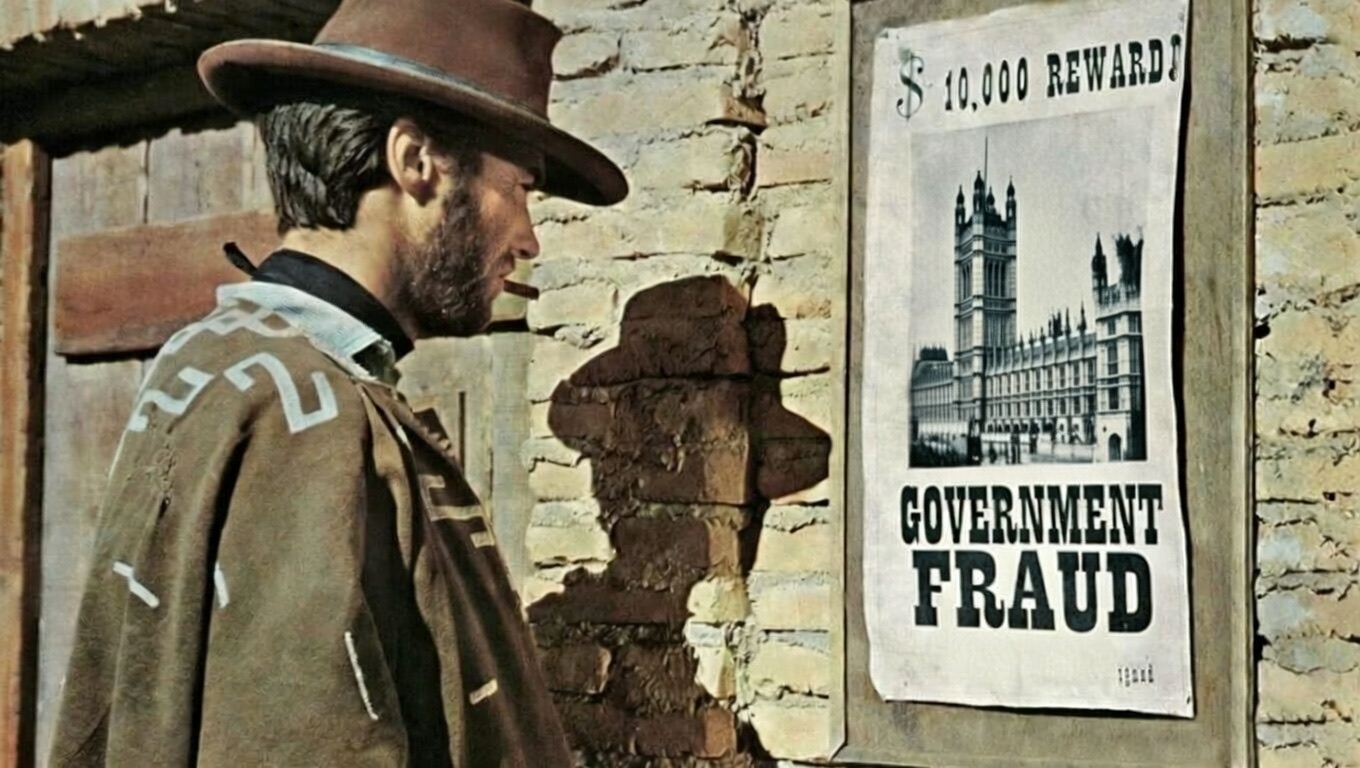This country bogs down anyone who tries to create value and get ahead. And it punishes everyone else, too. The Taxman is just the start of our problems but, as the Beatles put it:
If you try to sit… I'll tax your seat
If you get too cold… I'll tax the heat
If you take a walk… I'll tax your feet
Government has got out of hand. Our great country’s state and its capacity have been abused and exploited; in the name of modernisation and globalism, successive governments have overreached in scope and influence. In doing so, they have rendered themselves at best useless, at worst nefarious. And they’ve taken us all down with them. Today, the examples bleed across daily life.
Instead of fixed potholes, we got a profusion of speed cameras – from 1,600 in 2000 to around 8,000 today. Our councils sold off “parking management” to private companies, replacing the generosity of giving your ticket to someone else with faceless reg plate tech. Yet no one can sort out the “vape” and “barber” shops dominating high streets. Natural England (one of our 603 quangos) stops a local kite festival because of wild flower concerns. Meanwhile, while we at home spend 1.5 billion hours between us washing up our tuna tins to save the planet, only 17 percent of plastic waste is actually recycled. That’s £18 billion in minimum-wage time collectively spent sorting rubbish.
None of it makes any sense. All of it makes us miserable. No wonder so many people plug in (or just play the video out loud on the train), care more about the result of Love Island than the spectre of our national debt, and see sussing how they can sign up for the same handout everyone else gets as some kind of gameshow. For the more civilised, this dependence doom spiral presents a devastating futility.
It also points to the greatest challenge of our lifetimes: we are now all involuntarily complicit in this rubbish decadence. I call it abundant feudalism.
Today, one in three of us works for the state or for the organisations that do its bidding – in outsourcing, social care, construction, IT. If you are a nurse, a teacher, or in waste collection, the level of red tape you have to endure becomes your day-to-day.
Bureaucracy blocks the lives of millions every day. For public sector workers, it’s not simply the paperwork and the red tape, but the unquantified, un-asked for and ungodly burden of legislation that has hollowed out our public services and hamstrung the ability to get anything done.
The state creates and hoovers up knowledge workers too, turning bullshit work (as termed by the wonderful David Graeber) into a default way to spend your time on the planet. From working on another social value report, to finding yourself writing rules for a job you’ve never done, or working in an intellectualised environment where, for example, growth is seen as synonymous with government spending – a mindset that is turning us all into inadvertent socialists.
It is the same story for entrepreneurs and business owners who have to bear the endless barrage of regulation and interference from the blob. In this country, we have to work, we have to build and innovate in spite of the size of our state.
We all know what this is like as citizens, too. We fill in endless forms at work, contend with the ever-growing pile of green regs while enduring windows that don’t open in hotels, buses, restaurants – upping power costs, and the chances we’ll catch yet another virus. Then there are the speed cameras (all 8,000 of them), bus lanes, the ULEZ.
What happens to people when there’s too much state?
First, we try to do something about it, voting for “something different”. Recent history tells us, however, that whoever’s in Whitehall, it ends up being exactly the same. Bureaucrats can’t help themselves. Plainly put, like anyone else, they want to progress their own ends and purpose: very few people try to render themselves obsolete. Moreover, where decision-making and costs are divorced from one another – as they are in any setting without a profit motive – the measure quickly becomes the target. That means roles attached to perpetuating those targets and their fulfillment can be continually expanded.
Second, we become inured to paying more and more for less and less. We come to think that the state providing almost everything as a public service – and poorly – is normal. Whether we can afford it is ignored.
In June of 2025, the UK government spent £16.4 billion on debt interest. Not repayments, but interest alone; £500 per month from every single one of us who pays tax. It is not touching the sides; our country is in a debt doom loop. (This will happen to others across the world, too, where governments (via mandated central banks) print money and control the money supply.)
There is a fundamental underlying issue here: the state must become more indebted to pay for itself. In other words, the more of us roped in to prop it up, the more that has to be borrowed to fund salaries, and the more we fuel our own decline.
Third, with the state on our backs, we end up pitted against each other. Not only are we trapped in a pay more in, get less out cycle, but the state becomes the proxy for human interaction. We stop interacting with each other, instead expecting and demanding from the faceless entity. ‘Council run’ replaces local business, systems (housing?) replace functioning markets, state-funded charities replace philanthropy and, in the end, kindness. The thing that makes us human – the degree to which we can cooperate to advance ourselves, raising each other up and getting stuff done – has and continues to be dissolved away.
What can be done?
First, we must fight tooth and nail to build as many new capabilities with and for citizens as we can, including new services that will force the existing provision to get better. Competition is the only way to drive up standards: we must give citizens choice, while saving what remains of our state, and sorry public services. This is my life’s work, and I will devote it to ensuring that every person in this country has exceptional and affordable services; good experiences as an individual shouldn’t be limited to John Lewis, Monzo and the AA. We also need to make sure there are jobs that mean that none of us has to keep feeding the blob – that none of us has to work for Serco or G4S.
Second, we need people in power who will radically shrink the state, cutting spending and ensuring we cannot tread this dark path again. The individuals who do this will need both the will and capacity to entirely rewrite government. This is near-impossible stuff. It is a wholesale unravelling of what’s happened since 1997 – repealing, annulling; gutting government headcount (the civil service, the public bodies) so that taxpayers can enjoy paying less and less for more and more, rather than the reverse. It will mean revisiting how tradition-based legitimacy was supplanted by quangos and activist courts – which means going back to the Reform Acts. And it may mean revisiting the very notion of financing the state through debt, brought in under William of Orange so we could fight the French. (It was this that kicked off a monied class that profited from lending money to government, while others paid their interest through tax.)
Third, it falls to each of us to question our State of Dependence. As I touched on above, outcomes thinking (for which Western states are now so renowned) quickly goes awry when there is no profit motive involved. A decision can come at any cost. This phenomenon deserves its own piece, but as a starter for 10 on shifting our thinking – because we are, after all, the sum of the ideas we share and promulgate:
I am here for two purposes. To do as much damage as possible to the enemy and to hold my part of the line at all costs. Am I doing everything possible to ensure my being able to do this?
That is the first and last question of a Field Service Pocket Book for new officers on the frontlines of the British Army during World War One. A couple of things struck me, leafing through. First, that this clarity of purpose and simple but fundamental self-questioning is moribund today. To borrow from local authority mission statements, “Encouraging resilient communities” and “Purpose and pride to improve lives” are not goals. Without goals, the consequent subjective tasks and targets become worlds without end. Second, if you work for or around the state, the telos should always be to limit, and ideally reduce, cost. A suggested refrain: “Am I saving money for my fellow taxpayers?”; “Am I saving money for my country?”
The journey ahead is long and hard: government has become vast, sprawling and ineffective, and it has dragged us all down with it. And that is why we must all act, individually and together. We do not need to be coddled. We do not need to continue to allow our own demise. It is time to demand better and seize our destiny.







.png)



